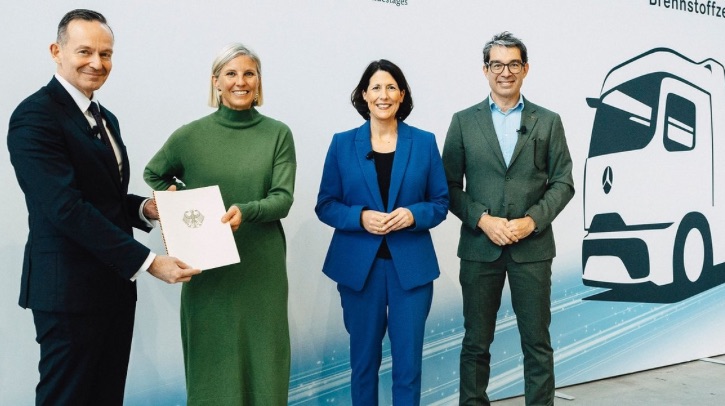The Germany Federal Ministry for Digital and Transport (BMDV) and the federal states of Baden-Württemberg and Rhineland-Palatinate have approved funding of €226m (US$239m) for the development, small-series production and customer deployment of 100 fuel cell trucks.
Daimler Truck filed an application for funding in 2021 for the development of fuel cell trucks and will now receive around two thirds of the total amount put forward in the IPCEI (Important Project of Common European Interest) funding application. Daimler will continue to carry a crucial part of the total investment in the development of fuel cell trucks on its own.
The funding project, created within the framework of the European Union’s IPCEI Hydrogen program, covers both vehicle and production-related activities. In addition to the development and build up of the vehicles, the funding will also be used for feasibility studies about the hydrogen value chain as well as investments in required production facilities and processes in preparation for planned series production.
Final assembly of the next-generation fuel cell trucks is set to take place at the Mercedes-Benz plant in Wörth and the trucks are expected to go into operation at various customers from the end of 2026 onward.
The application had been subject to extensive review, also by the European Commission. Karin Rådström, CEO of Daimler Truck, said, “The approval of funding for the development and small series production of 100 fuel cell trucks is an important boost for the use of hydrogen in road freight transportation. This funding is therefore a strong signal not only for Daimler Truck but for the entire commercial vehicle industry.”
Dr Volker Wissing, Federal Minister for Digital and Transport and Federal Minister of Justice, said, “I am pleased that my ministry is supporting the project together with Baden-Württemberg and Rhineland-Palatinate with a total of €226m. With the deployment of the new fuel cell trucks, we are gaining important insights for the future mix of drive technologies enabling sustainable freight transport.”
The project’s deployment of liquid hydrogen was positively highlighted within the scope of the IPCEI criteria. In its liquid aggregate state, the energy carrier has a significantly higher energy density in comparison to gaseous hydrogen. This means more range and ultimately enables comparable performance to a diesel truck.
In September 2023, Daimler Truck successfully demonstrated this when a public road-approved prototype of the Mercedes-Benz GenH2 Truck completed the #HydrogenRecordRun, covering 1,047 km with one tank of liquid hydrogen.
Mercedes-Benz says prototypes of the fuel cell truck were built and five customers are currently deploying these trucks in initial customer trials, gaining experience with fuel cell vehicles. The five semi-trailer tractors are deployed in different long-haul applications on specific routes in Germany and are refueled at two liquid hydrogen filling stations.
Daimler Truck has committed itself to the Paris Climate Protection Agreement. The objective is to offer only new vehicles that are CO2-neutral in global core markets (Europe, the USA, Japan) by 2039. Daimler is also focusing on electric trucks and is convinced that rapid and cost-improved coverage can only be achieved by using both technologies.


